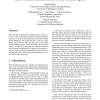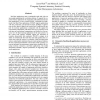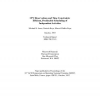109
click to vote
SOSP
1997
ACM
15 years 3 months ago
1997
ACM
Low-latency remote-write networks, such as DEC’s Memory Channel, provide the possibility of transparent, inexpensive, large-scale shared-memory parallel computing on clusters of...
138
click to vote
SOSP
1997
ACM
15 years 3 months ago
1997
ACM
Despite a large research effort, software distributed shared memory systems have not been widely used to run parallel applications across clusters of computers. The higher perform...
124
click to vote
SOSP
1997
ACM
15 years 3 months ago
1997
ACM
Multi-threaded programming is difficult and error prone. It is easy to make a mistake in synchronization that produces a data race, yet it can be extremely hard to locate this mi...
SOSP
1997
ACM
15 years 3 months ago
1997
ACM
SOSP
1997
ACM
15 years 3 months ago
1997
ACM
A common problem facing mobile computing is disconnected operation, or computing in the absence of a network. Hoarding eases disconnected operation by selecting a subset of the us...
105
click to vote
SOSP
1997
ACM
15 years 3 months ago
1997
ACM
In this paper we show that application-aware adaptation, a collaborative partnership between the operating system and applications, offers the most general and effective approach ...
129
click to vote
SOSP
1997
ACM
15 years 3 months ago
1997
ACM
Real-time applications such as multimedia audio and video are increasingly populating the workstation desktop. To support the execution of these applications in conjunction with t...
SOSP
1997
ACM
15 years 3 months ago
1997
ACM
The exokernel operating system architecture safely gives untrusted software efficient control over hardware and software resources by separating management from protection. This ...
SOSP
1997
ACM
15 years 3 months ago
1997
ACM
100
click to vote
SOSP
1997
ACM
15 years 3 months ago
1997
ACM
This paper presents a new model for controlling information flow in systems with mutual distrust and decentralized authority. The model allows users to share information with dis...




